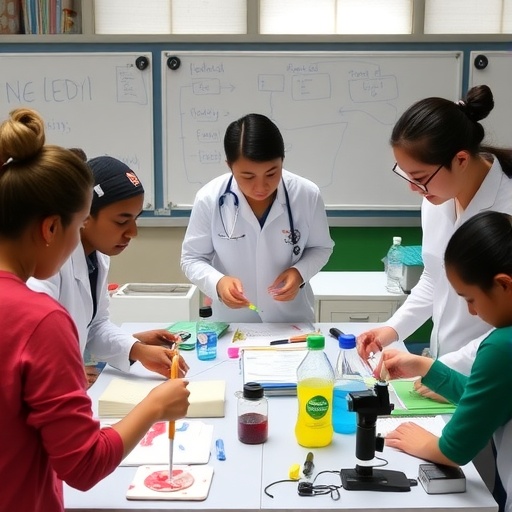In an era defined by rapid technological advancement and an ever-evolving landscape of education, the importance of integrating interdisciplinary approaches within teacher training programs has never been more crucial. A recent bibliometric analysis conducted by scholars Millán and Arango sheds light on the integration of STEM (Science, Technology, Engineering, Mathematics) and STEAM (which adds Art to the equation) methodologies in the training of natural sciences teachers in Colombia. This research not only highlights the significance of these approaches but also explores the underlying trends and their implications for the educational framework in the country.
The study meticulously reviews a vast array of scholarly articles, revealing how the STEM/STEAM frameworks have begun to penetrate teacher preparation programs. The overarching goal is to foster a more holistic understanding of natural sciences and to cultivate a generation of educators who are equipped to navigate the complexities of modern teaching paradigms. The analysis showcases the interdisciplinary nature of STEM and STEAM, emphasizing how bridging the gap between different fields not only enriches the learning experience but also promotes critical thinking and creativity among future educators.
One of the key findings from Millán and Arango’s research is the increase in publications concerning STEM and STEAM in the context of teacher training from 2010 to 2020. The data reveals a marked uptick in interest, underscoring a growing recognition of the necessity for this integrated approach. Such insights are critical, as they stress the importance of adapting educational methodologies to suit the demands of a technology-infused society and labor market.
The paper further elucidates the pedagogical shifts that accompany the incorporation of these approaches. For instance, the analysis highlights how project-based learning, a common element in STEM and STEAM education, encourages student engagement through practical, real-world applications. This pedagogical style not only enhances comprehension of scientific concepts but also equips teachers with the tools to foster a more dynamic classroom environment. As educators adopt these innovative methods, they can inspire students to pursue careers in fields traditionally underrepresented among the teaching population.
Moreover, the bibliometric analysis provides insights into the collaborative nature of research in this domain. Millán and Arango identified a growing trend in co-authored papers and international collaborations, signaling that the advancement of STEM/STEAM education is not confined to Colombia alone. The implications of this collaborative spirit extend beyond geographical boundaries, nurturing a global conversation focused on effective teaching methodologies and preparing teachers for the challenges of the 21st century.
The study also discusses the role of policymakers in promoting STEM/STEAM initiatives within teacher training programs. The findings suggest that there is a pressing need for governmental and institutional support to ensure equitable access to these progressive educational frameworks. By providing the necessary resources and training, educational authorities can empower future educators to innovate and inspire, ultimately impacting the quality of science education delivered to students.
Additionally, the authors delve into the critical role that technology plays in enhancing the effectiveness of STEM/STEAM approaches. With the advent of digital tools and online learning platforms, teacher training can become more interactive and accessible. The transition to such technology-rich environments aligns perfectly with the principles of STEM education, where technology serves not just as a tool for instruction, but as a medium for collaboration and engagement.
Furthermore, Millán and Arango highlight the essential role of assessment in STEM/STEAM education. The authors argue for a shift from traditional assessment models to more authentic assessment strategies that measure students’ ability to apply their knowledge in practical and meaningful ways. This transition is crucial, as conventional assessments often fail to capture the depth of understanding and skills acquired through integrated learning experiences.
The impact of STEM/STEAM education on teacher training in Colombia is profound, with implications that reach beyond the classroom. As educators become adept in these interdisciplinary approaches, they are better equipped to inspire a generation of students who are not only proficient in science but are also innovative thinkers and problem solvers. This holistic educational philosophy promises to contribute significantly to addressing the global challenges of our time, from climate change to technological disruptions.
In light of the ongoing global challenges, Millán and Arango’s findings emphasize the urgency for educational reform that prioritizes the integration of science, technology, engineering, arts, and mathematics. Their research embodies a call to action for educators, policymakers, and stakeholders to embrace the transformative potential of these approaches, ensuring that the future of education is not only about imparting knowledge but also about nurturing creativity and innovation.
In conclusion, the bibliometric analysis presented by Millán and Arango serves as a pivotal resource for understanding the current landscape of STEM/STEAM education within teacher training in Colombia. It sheds light on both the progression of research in this field and the necessity of continued advocacy for innovative teaching methodologies. As Colombia moves towards a more integrated educational model, the implications of this study offer valuable insights and underscore the importance of preparing educators to thrive in an interconnected, rapidly changing world.
Subject of Research: STEM/STEAM approaches in teacher training for natural sciences in Colombia.
Article Title: Bibliometric analysis on the STEM/STEAM approach in the training of natural sciences teachers in Colombia.
Article References:
Millán, M.D.C.S., Arango, J.P.B. Bibliometric analysis on the STEM/STEAM approach in the training of natural sciences teachers in Colombia.
Discov Educ 4, 266 (2025). https://doi.org/10.1007/s44217-025-00735-9
Image Credits: AI Generated
DOI:
Keywords: STEM, STEAM, teacher training, natural sciences, Colombia, interdisciplinary education, pedagogy, educational reform, bibliometric analysis.




